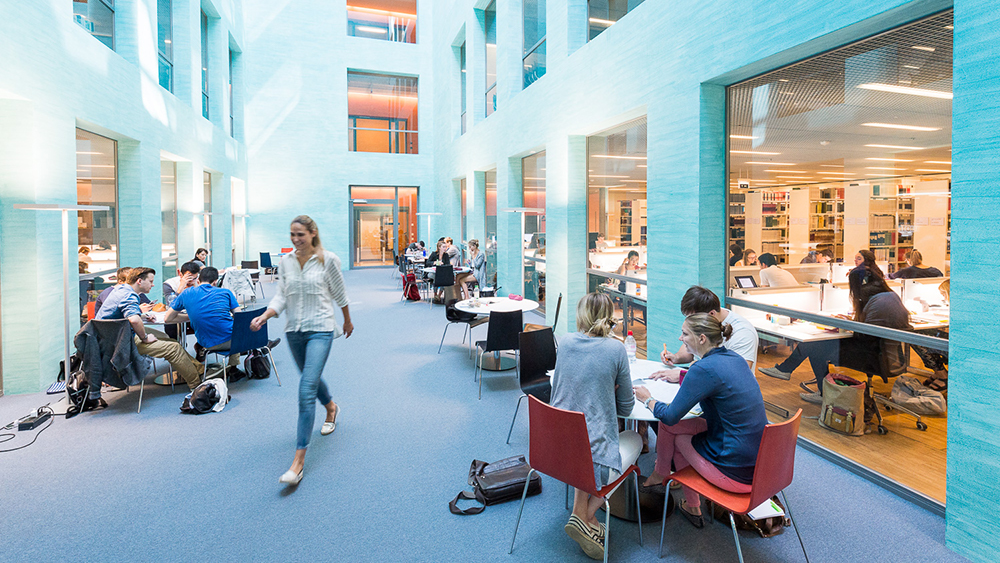Library of the Future
The University of Zurich currently has more than 40 autonomous libraries spread out across about 80 sites. Besides the Main Library (Hauptbibliothek, HBZ), there are also small and very small specialized libraries in the faculties and institutes and departments. They are independent from the Main Library and the relevant faculties or departments/institutes. This multilayered library system no longer meets the current and future needs of academic information retrieval, according to an evaluation of UZH’s library services carried out by an international team of experts in 2017. In early July 2017, the Executive Board of the University therefore resolved to merge all UZH libraries into one University Library UBZH.
A central infrastructure with a clearly defined list of services as well as an optimized site concept brings about several advantages, because the library services can be better aligned with and suited to the needs of users. Centralizing library services will also deliver multiple benefits in terms of the future challenges associated with digitalization, open science, and data management. Ultimately, it’s the students who should benefit from the expanded services provided by the University Library UBZH and a modern learning center.
Vice President Christian Schwarzenegger talks about the library of the future in the interview below.
Vice President Schwarzenegger, you are heading up the “UZH Library of the Future” project. What are the project’s goals?
We want to make UZH library services fit for the future. The decision to focus on two major sites – UZH City Campus and UZH Irchel Campus – allows us to also take a great step forward in the area of libraries. Research and teaching stand to benefit from the opportunities provided by digital information retrieval, processing, and storage. Professional library services will be able to be developed while efficiently managing the traditional book and journal collections.
Are there any leading examples for these goals?
For our “UZH Library of the Future” project, we sought information from renowned international universities that had built up state-of-the-art library structures, such as Harvard University or Leiden University. This is how we realized that UZH was lagging behind current developments. Our library structures must become more efficient, since digitalization affects all scientific fields and requires new strategies of information retrieval, processing, and storage. Libraries are strongly affected by these processes. They have to maintain their traditional print collection, while also offering and increasing digital services. Digital e-media have to be managed in a way that makes sense for all involved.
What do students and researchers stand to gain?
We will create learning centers with plenty of space and a pleasant learning environment. The arts and humanities libraries can be combined into one cluster, which will benefit everyone. Further advantages include group work rooms, digital support for the reservation system, additional study places, more staff, and attractive opening hours.
The new library will also provide a host of new services, such as data management plans for applying to the Swiss National Science Foundation, open access support, and data research using machine learning. Thinking about access to original works and digitalization them, I also see new potential for research. This could lead to completely new transdisciplinary research.
How would you describe the current situation?
There is no actual university library at UZH, which means that over the years the individual department and faculty libraries have developed very differently. The result is a very mixed library environment that lacks a common strategy. And this is true in terms of staff structure as well as for the on-site room situation and the services that are offered.
Some department heads are concerned that their specialized libraries will become less important as a result of the reorganization.
Many of the specialized libraries are in the houses that UZH has rented. According to the cantonal structure plan, these villas and houses have to be reverted to their original use. The new building infrastructure that is being developed as part of the Stadtuniversität UZH project will make it possible to bring the departments and institutes together in one location. This is an opportunity we should take.
Today, there is an overlap of up to 40 percent with regard to the books in various specialized libraries. A centralized structure would thus enable us to reduce the number of multiple purchases. What’s more, a central organization allows us to conclude binding agreements with the Zentralbibliothek Zürich through a better organized collective profile. Many of the processes are currently still uncoordinated.
A specialized library is considered a department or institute’s calling card and often features special editions and works. How can this exclusive aspect be retained?
Valuable books and collections will continue to be maintained and expanded. The members of the professorial staff will of course have a say when it comes to purchases. We’ll define more precisely how orders will be handled during the main phase of the project from 2019 onwards. The specialized librarians will be embedded in a central organization, but will still be in contact with researchers and students as part of their professional tasks.
A Tages-Anzeiger newspaper article recently mentioned that 60 out of 80 specialized libraries will be closed. Is this true?
The numbers are wrong. We have around 40 libraries that exist as separate organizational units. But these organizational units maintain multiple library rooms. The Tages-Anzeiger confused library rooms with faculty libraries. In the future, the aim is to have a uniform library organization at UZH, but it will still be responsible for multiple sites. In the first six to seven years, the move into the FORUM UZH will be prepared. This will include relocating about 20 sites to the new premises. So nothing’s going to be closed, but rather sites will be combined into one location.
Which libraries will remain at their current sites?
The structural plan decided by the Parliament of the Canton of Zurich marks off of the university area, and any sites currently outside of this zone are to be moved inside. The aim is for researchers, students, media, and books to stay together. The exact details still need to be worked out, but the law and business and economics facilities require a lot of space. The structural plan also requires a few of the arts and humanities subjects to move into the new educational and research center “FORUM UZH”. The library of the Faculty of Theology, however, is not affected.
It’s been claimed that books will be disposed of or put in remote storage rooms. Is this true?
There are two or more copies of many standard reference works, dictionaries, and journals on the library shelves. When the department libraries are merged in the FORUM UZH, it will no longer be necessary to display all of the copies of these books. Some are available digitally, while for others only keeping one copy in the library won’t bring any disadvantages. This kind of gentle reduction is planned. In return, we gain space, one of the most expensive factors when it comes to libraries.
What about the librarians’ jobs?
It’s just a rumor that we want to cut jobs. But the job profile of librarians is set to change dramatically as a result of digitalization. We want to help with this process and provide training that will allow our librarians to tackle the challenges of the future.
When will the FORUM UZH be ready to move into?
The move is planned to take place in 2025/26.

